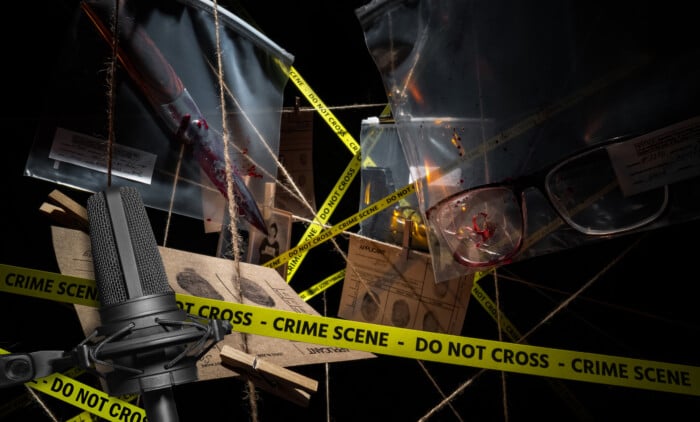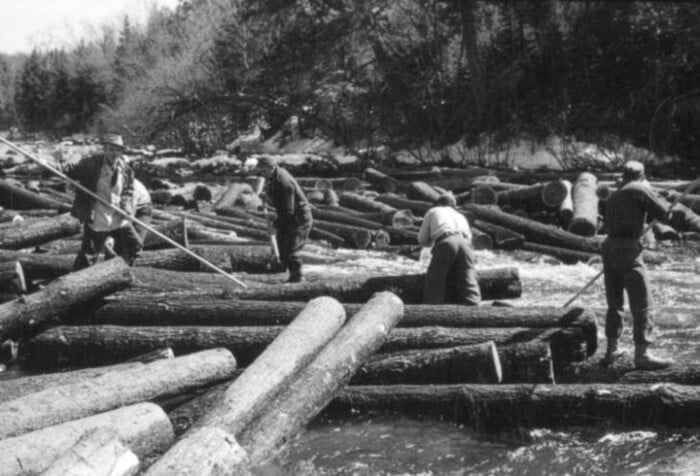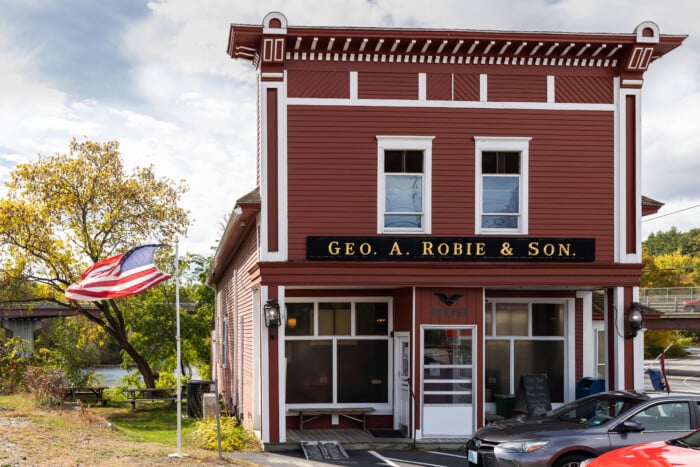Myth, Music & Magic in the Streets of Concord
How Rick Broussard and John Hession brought the Greek tragedy of Orpheus to New Hampshire after a decade of creation
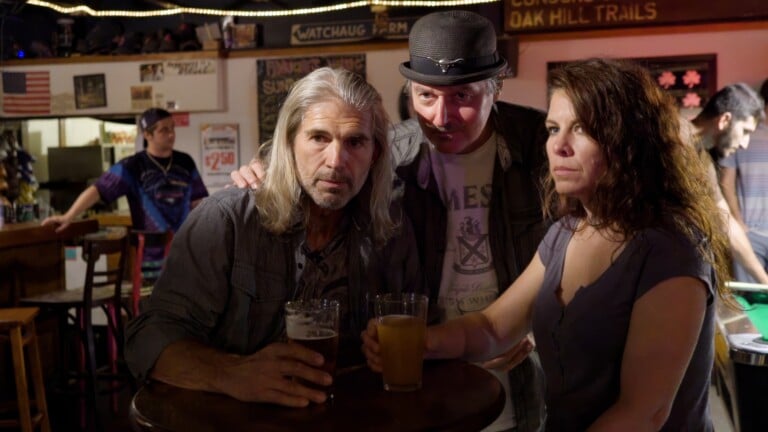
After a long 10 years in the making, Resurrection Films’ “Granite Orpheus” will emerge from the depths of the creative underworld to the bright lights of the big screen for its official debut.
Produced and directed by journalist and former New Hampshire Magazine editor Rick Broussard and filmmaker John W. Hession, “Granite Orpheus” is a contemporary reimagining of the myth of Orpheus, a talented musician, and his wife, Eurydice, star-crossed lovers.
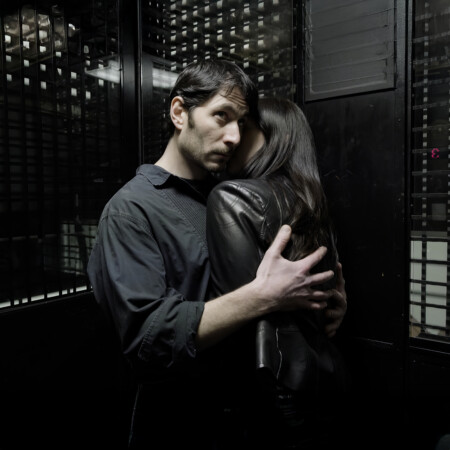
Orpheus (Bryan Halperin) embraces Eurydice (Gina Carballo) on the long elevator ride out of Hades in the concluding scenes of Granite Orpheus. Photography Courtesy of Resurrection Films
In the classic Greek tragedy, Eurydice dies shortly after her marriage to Orpheus. Hell-bent on bringing her back from the Underworld, Orpheus succeeds in convincing Hades to let her return. But under one condition: He can’t look back until they both emerge from the darkness. In doubt, Orpheus turns around, and Eurydice is gone forever.
“The Orpheus story is attractive because it’s the story of every person,” Hession said. “You can find something you love, then death rears its face, and you have to let it go. That’s no reason not to engage in the act of love. We hope the audience connects with that and gets a sense that life is still worth it in the face of death.”
Founders of Resurrection Films, a New Hampshire-based production company with a mission to revive the independent film industry in the Granite State, Broussard and Hession have long discussed making a film together. With a shared admiration for filmmaker Jean Cocteau, who directed the 1950 dream-like film “Orpheus,” they considered
it only natural to remake a French classic.
“It’s a classic that marks eras, and marks genres,” Broussard said. “Occasionally, one dips back into the source material and maybe contextualizes it in a unique sense that’s about you.”
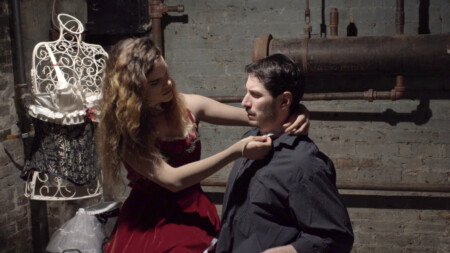
Chloe Barcelou, as Hades’ seamstress, attempts to distract Orpheus from his underworld quest for eternal love. Photography Courtesy of Resurrection Films
Inspired by another French remake of the tale, “Black Orpheus,” which takes place during Carnaval in Rio de Janeiro, the pair made the creative decision to film on the streets of downtown Concord during the annual Market Days Festival.
“Market Days is our Carnaval,” said Broussard.
“Granite Orpheus” opens in a basement dive bar, a full crowd bopping to the sounds of local rock band Pat and the Hats. Viewers are quickly introduced to Orpheus, downtrodden by the loss of his first love in a tragic motorcycle accident. After singing a mournful song for the crowd, Orpheus is approached by Eurydice, who drags him out of his depressed state during their adventures around town.
Concordians will recognize iconic sites in the film: Penuche’s Ale House, Tom Devaney’s art studio and the Arnie’s ice cream booth, which has been a Market Days staple for decades.
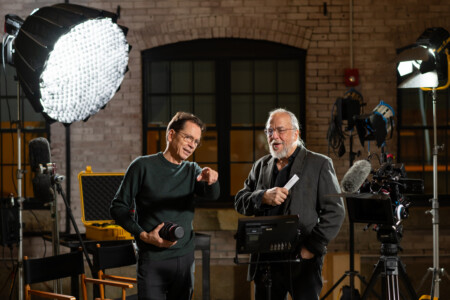
Granite Orpheus filmmakers John Hession, left, and Rick Broussard on set for a shoot at Manchester’s The Factory on Willow. Photography Courtesy of Resurrection Films
“I was originally hoping that people would not be bored, not be confused, and that it would delight Concord,” Broussard said. “And I’m pretty sure it’s gonna delight Concord.”
The film stars local director and playwright Bryan Halperin (Orpheus), co-founder of Powerhouse Theatre Collaborative at the Colonial Theatre in Laconia and Gina Carballo (Eurydice), an actor and board member with Firelight Theatre Workshop, a professional company in Peterborough.
“This was definitely a fly-by-the-seat-of-your-pants kind of indie filmmaking,” said Halperin, who, despite his experience in theatrical directorial and acting roles, had never done anything on film before this project.
“There were no scripts to begin with. They looked for interesting places and things to do at Market Days, turned the cameras on us, and said go.”
An experimental passion project, Broussard and Hession set out with a basic outline and intentions to film enough footage in a single weekend. Quickly, they recognized the need to recalibrate. Two days of filming turned into nine as scripts developed and more artistic talents were drawn to the project.

The first touch between Eurydice (Gina Carballo) and Orpheus (Bryan Halperin) on stage leads to a romance and adventure spanning the worlds of the living and the dead. Photography Courtesy of Resurrection Films
“Rick is really good at collecting people, musicians or magicians, artists,” Halperin said. “All these people from his world that he threw into various cameo roles. It was a fun way to work on an artistic project, even though very few of them had any acting experience.”
This proves true of Yarrow Farnsworth (Hades) who was typecast as a biker for the film. In Cocteau’s version, motorcycles appear at varying moments, signaling the presence of the Underworld on Earth. Wanting to preserve this theme in the film, Hession reached out to Farnsworth — a vital member of a Lebanon-based women’s motorcycle club — and asked if she and friends might be interested.
“It was serendipitous. We reached out and built a community,” Hession said.
“This is one of the things we were experimenting with,” Broussard added. “The idea, with very little in advance, art will produce its own materials for you to work with. At every point, there were these different blessings from the universe.”

Hades reunites with Eurydice as Orpheus stands alone and defeated in Concord’s Eagle Square. Photography Courtesy of Resurrection Films
Broussard recalls the major construction project occurring in 2015. Half of Main Street was demolished, an apparent symbol of the movie’s dual realms. “It was a transitional point between the epochs, and we filmed a story about Orpheus during it. If that doesn’t have magic, what does?”
After the original days of filming, life intervened — technical difficulties, family obligations, a global pandemic — and the project was postponed. It wasn’t until this year that Broussard and Hession were able to shoot the final scene, allowing their creative epoch to come to a close.
“Art is a force that will find a way to reveal itself,” the description reads on the film’s website, “as long as the Artist is willing to endure until the end.”
“Granite Orpheus” has been submitted to the NH Film Festival (Oct. 16-19) for consideration. Visit resurrectionfilms.org for updates and future screenings.

